Bed bugs are nasty parasitic insects that can be difficult to eradicate and prevent. If you’ve been wondering what ways there are to kill or get rid of bed bugs quickly, naturally, and effectively—keep reading!
Embarking on the battle against bed bugs requires a strategic approach, and what better way to combat these persistent pests than with the power of nature? Want to know, ‘Does tea tree oil kill bed bugs?’, ‘What smell do bed bugs hate?’, ‘What essential oils kill bed bugs?’ ‘Does peppermint oil repel bed bugs? Or just wish to find what deters bed bugs? If you want to know all about essential oil for bed bugs, you have come to the right place!
In this guide, we’ll explore the realm of essential oils for bed bugs and scents that bed bugs hate, unraveling the mysteries of tea tree oil, lavender, peppermint, and more. Discover the aromatic arsenal that can effectively repel and eliminate bed bugs, leaving your sanctuary free from these unwelcome intruders.
What Are Bed Bugs?
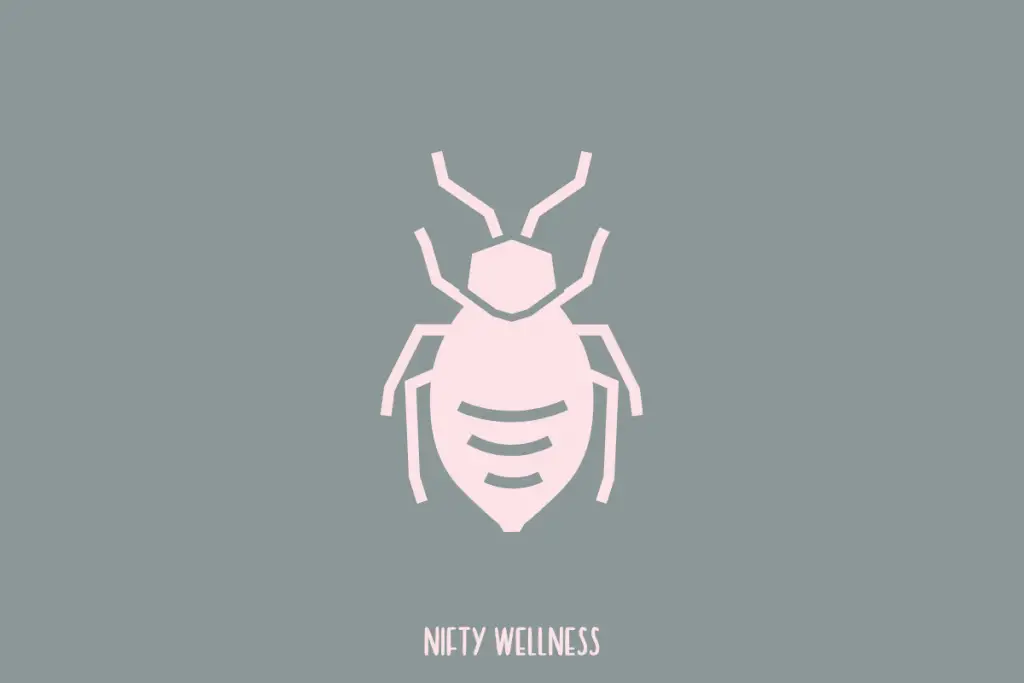
Bed bugs, or Cimex lectularius, are small, oval-shaped, brownish-red parasitic insects, that bite and feed on sleeping humans and animal’s blood.
Full-grown bed bugs are about the size of an apple seed, with flat bodies that swell after feeding. Bed bugs are wingless and do not fly, but they can move quickly!
You can find them hiding in the cracks and crevices of beds, bed springs, bed frames, headboards, and objects surrounding the bed like books. Bed bugs have also been known to cover floors, walls, and ceilings.
Bed bugs can be found worldwide in the Americas, Asia, Africa, and Europe. Since they are solely attracted to blood, bed bug infestations can occur anywhere that people sleep, from five-star hotels, apartment complexes, or cruise ships.
However, your risk of encountering bed bugs increases in places with high turnover rates, such as hotels and hospitals. Though they typically stick to hiding in and around the bed, bed bugs can also hide in your luggage, clothing, or other personal items.
Symptoms Of Bed Bug Bites
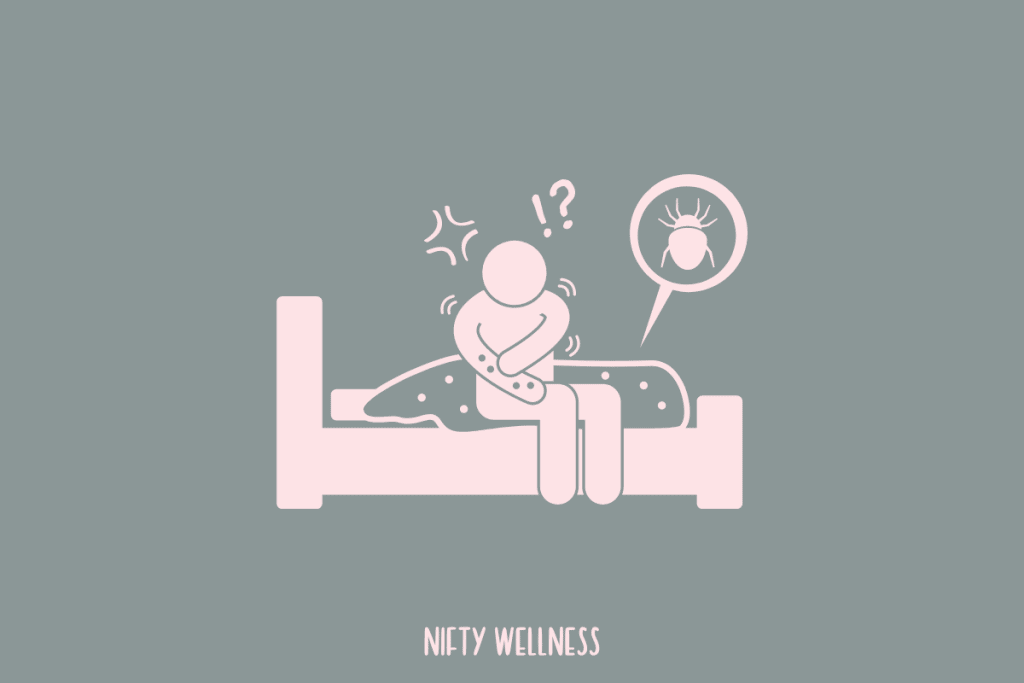
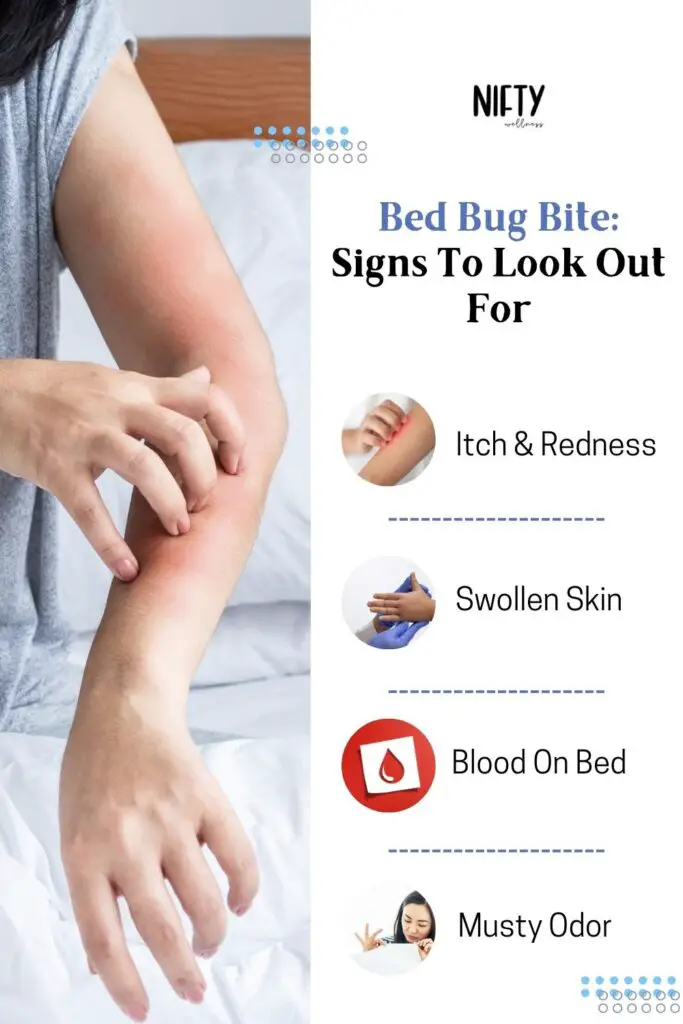
When they feed, bed bugs will insert an anesthetic and an anticoagulant that prevents a person from knowing they’ve been bitten. Consequently, small bite marks will appear from one to several days after the initial bite.
A bed bug bite can affect each person differently, but in general, bed bug bites are itchy, red, and are slightly swollen or agitated.
They are often located on the face, neck, arms, and hands. It is common for the bites to trail one another in a rough line or appear in a congregated cluster.
For some, a bed bug bite can cause an onslaught of adverse allergic reactions, that include swollen and enlarged bite marks, painful swelling, severe itching, and hives.
Other Signs of Bed Bugs
In addition to skin bites, other signs that you have a bed bug infestation include:
- Blood spots on your bed sheets or pillowcases
- A strong, unpleasant, musty odor coming from your bedroom
- Dark, rust-colored spots on your mattress, bedding, or walls
- Shedding and eggshells (produced when the bed bugs grow and shed old skin) found in and around your bed or other places that bed bugs hide
Cleaning Your Space First
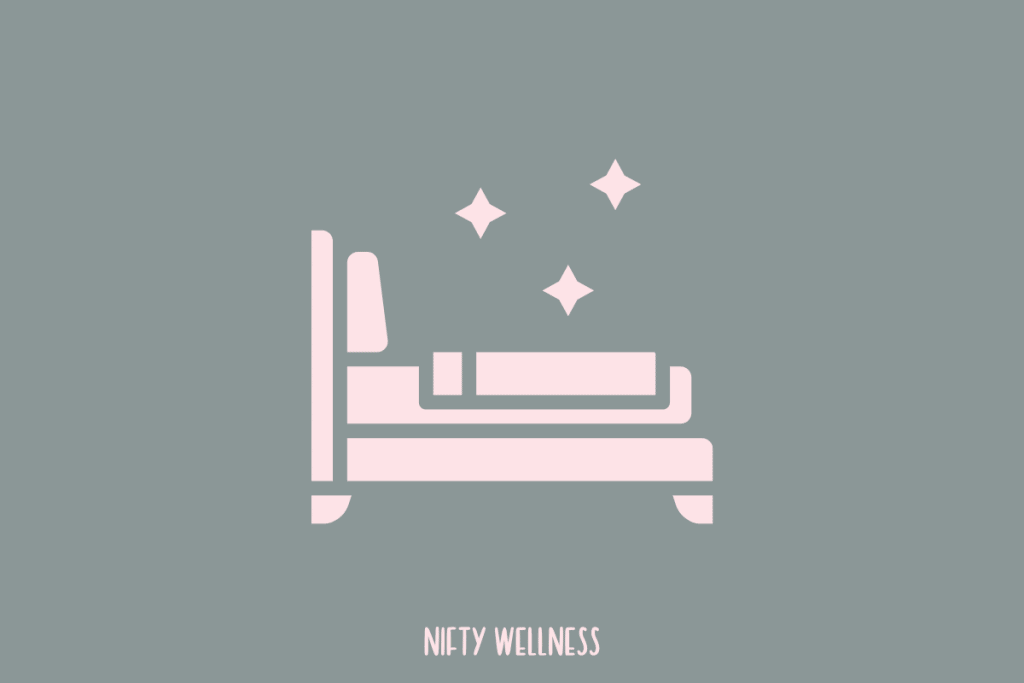
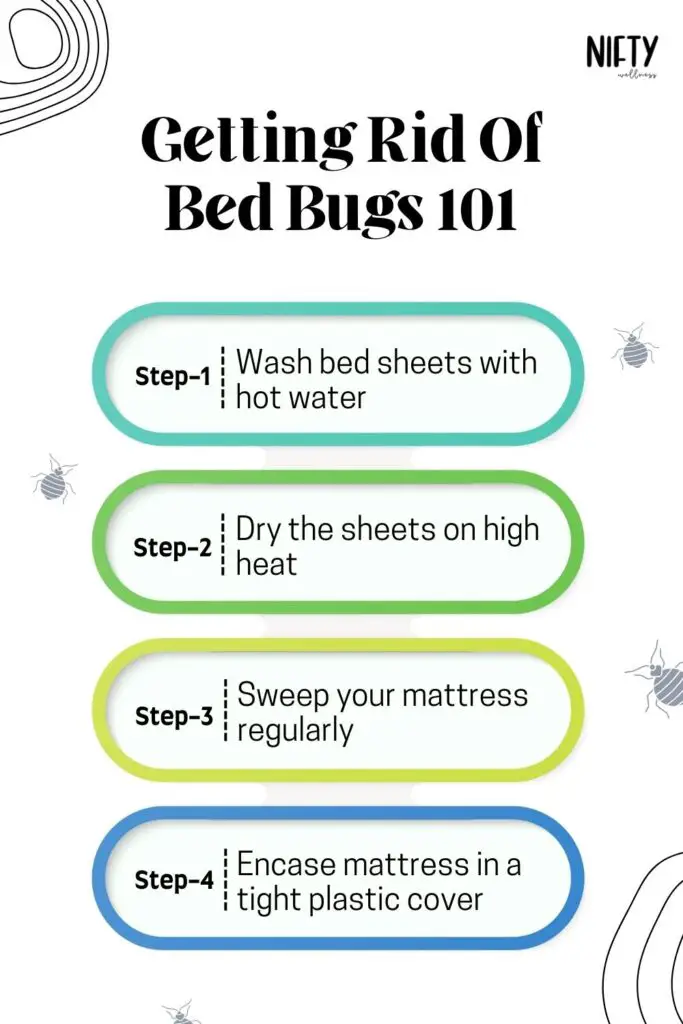
If you have a bed bug infestation, cleaning your space is essential in getting rid of these pests. First, you will want to remove and wash your bed linens, curtains and clothing on a hot, sanitizing setting before drying them on the hottest setting possible.
If certain items can’t be put in the washing machine, drying them on high for at least 30 minutes can effectively kill and remove the bugs.
Before vacuuming, scrub your mattress seams with a stiff brush to remove any bed bugs and eggs clinging to the fabric. Then sweep your bed, flooring, and other surrounding areas thoroughly.
Afterwards, you will want to remove the vacuum bag and immediately take it to the trash. You will want to vacuum daily or as often as possible to ensure that you are deep cleaning and removing of all those pesky crawlers.
Because bed bugs can live for up to a year without feeding, you will want to encase your mattress and box springs in tight plastic covers, to prevent any bugs from entering or escaping for at least one year.
Read our latest blog “The Ultimate Guide To Oils For After Shaving: Achieve a Smooth and Nourished Skin” to explore about the oils that are not just about scent or slickness and they are packed with nourishing properties that hydrate and protect your skin from the rigors of shaving.
Are Essential Oils Good For Killing Bed Bugs?
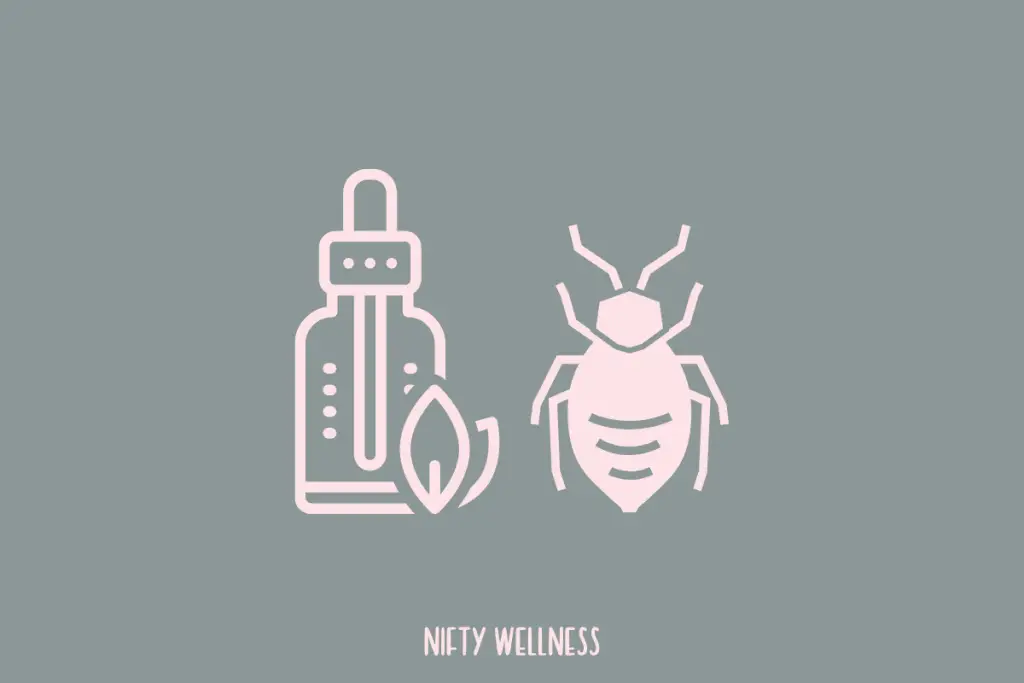

Treatments for eradicating bed bugs typically include chemical treatments such as insecticides.
These chemicals are sprayed in-and-around your rooms, beds, and sofas— any places that you live, breathe, sleep, and come into direct contact with every day; exposing you to potentially damaging substances.
As more and more people become aware of the possible dangers of chemicals, insecticides, and pesticides, many choose essential oils as a natural way to kill and treat bed bug infestations.
Several studies have found essential oils to be potent, natural and plant-based pesticides that effectively control and kill bed bugs; with some results showing efficacy of over 99%.
Based on this research, essential oils could be efficient resources for preventing, cleaning, treating, and eradicating bed bugs.
What are Essential Oils?
Essential oils are naturally derived plant extracts that capture the plant’s essence and its beneficial compounds and functions.
These oils have been used for centuries across the world for aromatherapy, health practices, religious ceremonies, food preparation, and beauty treatments.
While they are most commonly used for aromatherapy benefits, essential oils have proven to be effective topical, oral, and therapeutic ingredients used for treating countless ailments.
Many essential oils are natural insecticides and have proven to be highly effective when it comes to killing and repelling bugs.
Before using essential oils, it is important to remember that these plant extracts are highly concentrated. So be sure to dilute the oils before each use.
Best Essential Oils For Getting Rid Of Bed Bugs

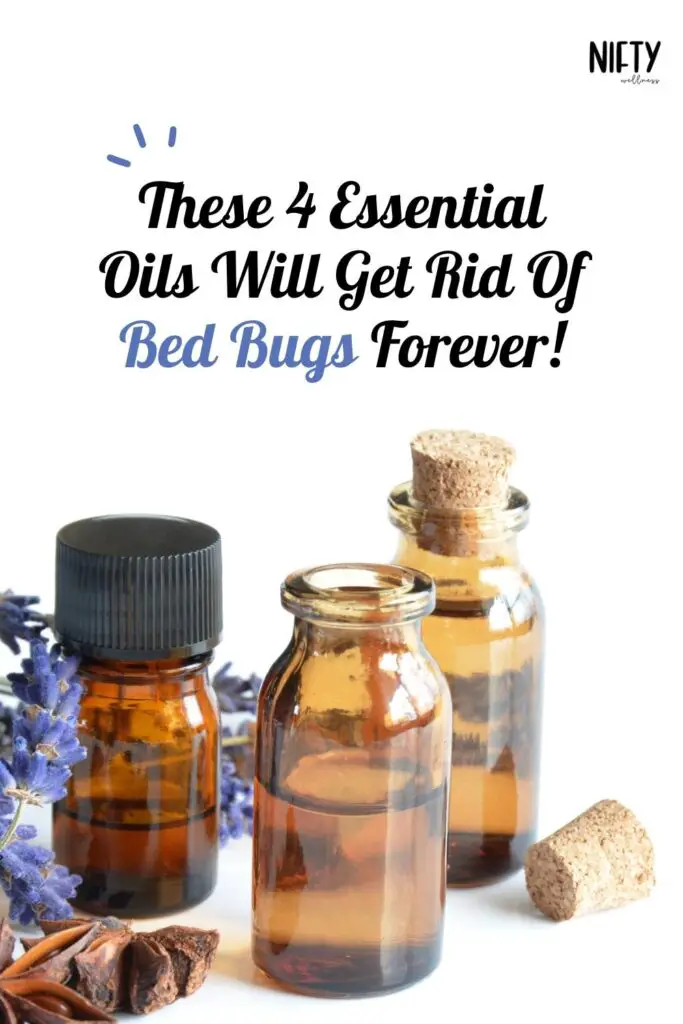
There are more than 90 types of essential oils, not including blends of several oils, all with their own unique benefits. Amongst this list are several essential oils that have shown immense potential to prevent and remove bed bugs.
Lavender Oil
Lavender essential oil is made from the lavender flower and is a potent remedy in repelling bed bugs. While the lovely floral scent of lavender is beautiful and calming for humans, bed bugs despise the smell.
Lavender essential oil is one of the most effective oils for getting rid of bed bugs naturally. If you are going to use lavender to eradicate bed bugs, opt for pure English lavender, also known as L. Angustifolia oil, as it is the best species of lavender known to kill and repel bed bugs.
One successful method for using lavender essential oil to treat bed bugs is to make a repellant spray.
Using one drop of lavender essential oil for every ounce of distilled water (30-40 drops per 30 ml of water) you can make a natural, diluted spray that can be used on your bed, bedding, carpets, and clothing.
The spray’s mechanics will coat the room and materials in the solution, ensuring that it gets everywhere you spray it. Lavender oil can also be put in a diffuser to spread the scent throughout your home.
Tea Tree Oil
Melaleuca oil, commonly known as tea tree oil, is known for its antibacterial, antimicrobial, and anti-parasitic properties.
Tea tree oil’s disinfectant and intoxicating smell makes it a strong insect repellent. In addition, tea tree oil has been shown to weaken, suffocate, and even kill parasitic insects like bed bugs and their eggs.
Like lavender, tea tree can be diluted with water and sprayed over bedding and other areas. Tea tree essential oil can also be diluted with a carrier oil or lotion and applied topically to the skin to soothe or prevent bites.
Peppermint Oil
Peppermint essential oil is an excellent oil for killing bed bugs as it is revered for its antimicrobial and insect-repelling properties.
Peppermint’s strong scent also triggers hypersensitivities in the bugs, repelling them and distorting their sense of direction.
Peppermint essential oil is powerful and should always be diluted before use.
Lemongrass Oil
Lemongrass essential oil not only repels bed bugs, but its strong acid content kills the bugs and prevents their eggs from hatching.
Its light, citrusy scent deters bed bugs and forces them away from areas where lemongrass has been applied or sprayed.
Lemongrass essential oil can be diffused in the air or diluted in a spray. If lemongrass oil is applied directly to the bugs, it will likely kill them instantaneously.
Varicose veins bothering you? Check out our latest blog 7 Best Essential Oils for Varicose Veins. Dive into the world of essential oils – a holistic approach to soothing discomfort.
How To Make Homemade Bed Bug Spray With Essential Oils
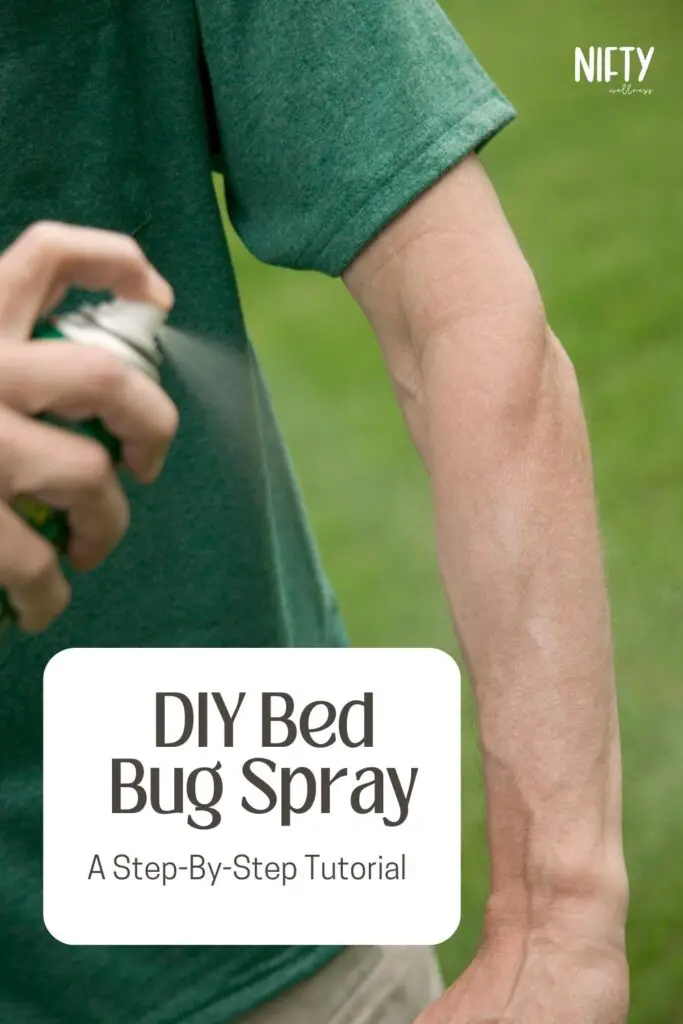
Making your own natural, homemade bed bug spray is extremely easy and very practical. All you need is a bottle with a top attachment that can produce a fine mist.
A general rule of thumb is to use 20 drops of essential oils per 30 ml of water, except for lavender oil, which needs closer to 30-40 drops of oil per 30 ml of water.
Shake the bottle well to distribute the oils evenly. Lastly, spray any areas where you want to repel or kill bed bugs.
Other Home Remedies for Bed Bugs
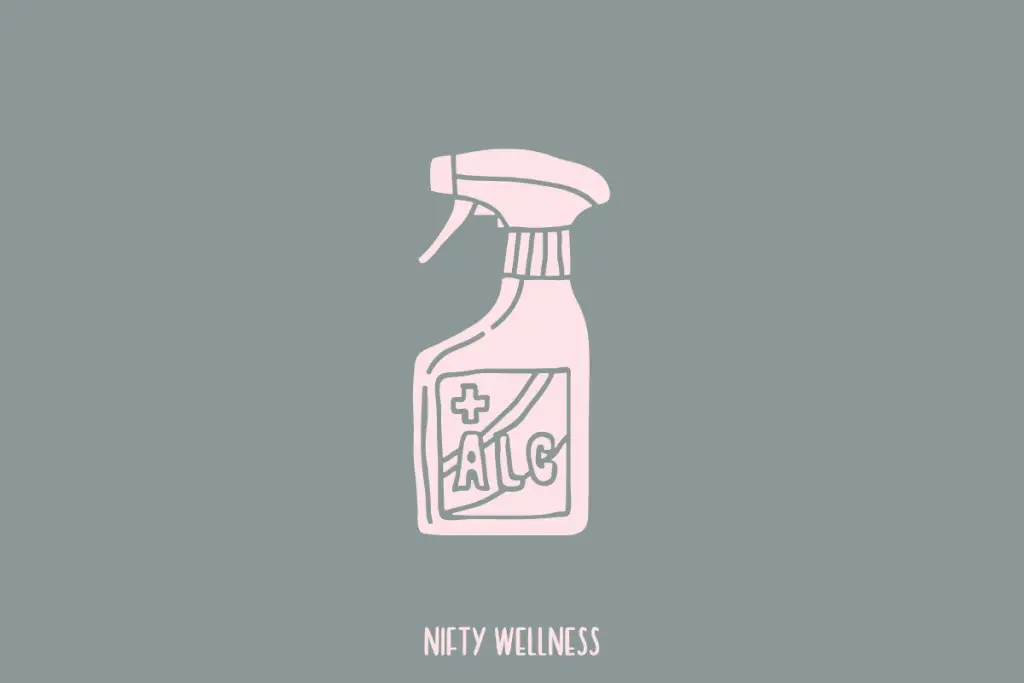
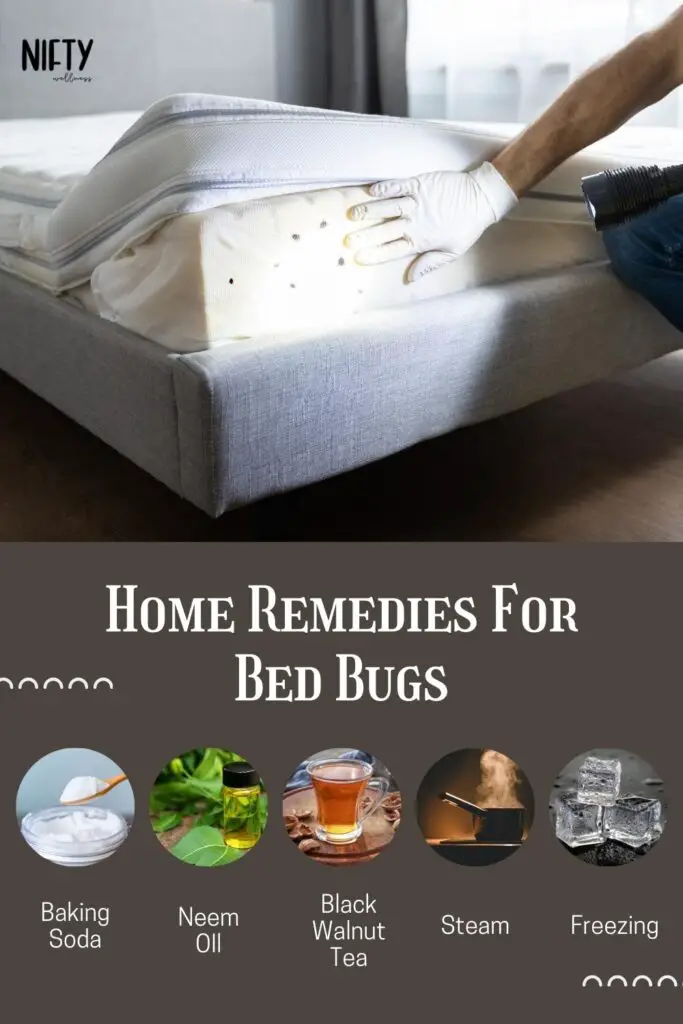
Beyond essential oils that kill bed bugs, various home remedies prove effective against bed bugs. Steam cleaning, with temperatures over 140 degrees Fahrenheit, efficiently kills bugs and eggs, especially when combined with essential oils like lavender or tea tree. Freezing items in plastic bags for at least 24 hours eradicates both adult bugs and eggs. Diatomaceous earth, a powdery mineral, acts as an abrasive insecticide, but caution is needed to avoid direct skin contact.
One can also try alternative remedies besides using scents that repel bed bugs. Baking soda, when sprinkled on hiding spots, dehydrates bugs by removing moisture. Rubbing alcohol, with 90% concentration or more, kills bugs on contact, but its flammability requires caution. Neem oil, a natural insect repellent, deters bites and laying eggs. With astringent properties, black walnut tea can be placed in bug-prone areas. Combining these remedies offers a comprehensive and natural approach to address bed bug infestations.
Steam
Steam is a natural and effective option for removing bed bugs from your home. Temperatures exceeding 140 degrees Fahrenheit have been shown to kill the pests and their eggs. Steam cleaning can also be teamed with essential oils such as lavender, tea tree, and peppermint to eliminate bed bugs.
Freezing
For those items that you can’t steam or put in the washing machine, you can put them into plastic bags and freeze. Because the bed bugs cannot survive in extreme cold, freezing them for at least 24 hours will kill both eggs and adult bugs. Afterwards, shake the item to remove the dead bed bugs.
Diatomaceous Earth
Diatomaceous earth is a powdery mineral mined from extinct bodies of water and sedimentary rock. It has been widely used as an insecticide powder for thousands of years, as it contains tiny abrasive particles that injure and kill insects.
Diatomaceous earth is a highly effective treatment for killing bed bugs, but it can take up to ten days to work. To use, spread the powder in cracks, crevices, and places on the floor where the insects may crawl.
Because of its tiny microscopic shards, it is not recommended to use diatomaceous earth on your mattress, bedding, or other places that come into direct contact with your body.
Be careful not to inhale diatomaceous earth by ensuring that you wear protective measurements such as a face mask.
Baking Soda
A popular home remedy in getting rid of bed bugs is to sprinkle a light layer of baking soda on the areas where bed bugs hide, such as the mattress. The baking soda will dehydrate the bugs by removing moisture.
Once the baking soda sits for up to a week, use the vacuum cleaner to remove the dead bugs.
Rubbing Alcohol
Many people use the standard household product, rubbing alcohol, to kill adult bed bugs, larvae and eggs. Spraying an alcohol dilution of 90% or more directly onto the bed bugs will kill them on contact.
However, please take caution when spraying rubbing alcohol as it is highly flammable and should not be inhaled.
Neem oil
Neem oil is a natural insect repellent and pesticide. It derives from the seeds and leaves of the neem tree and has been used in India for thousands of years as a natural pesticide and treatment for wounds, bites, illnesses and injuries.
Neem oil can be an effective bed bug deterrent and can be applied to exposed skin to keep bed bugs from biting and laying their eggs. The neem oil’s scent masks a human’s natural smell, which keeps bed bugs from finding you.
Neem oil can also be used as a skin treatment for soothing bed bug bites.
Black Walnut Tea
The leaves of black walnut have astringent and insecticidal properties that have shown great effectiveness against bed bugs. To use, sprinkle the tea or place tea bags in places where bed bugs are likely to hide.
Conclusion
In conclusion, combating bed bug infestations can be achieved through a combination of natural remedies, with essential oils, playing a crucial role in the battle against these persistent pests. From tea tree oil for bed bugs to neem oil for bed bugs, you can try these essential oils to kill bed bugs. Lavender oil, known for its calming scent, tea tree oil with its antimicrobial properties, peppermint oil, for its insect-repelling abilities; and lemongrass oil, a natural bed bug deterrent, are powerful essential oils that can be harnessed to create homemade bed bug sprays.
Now you know the relationship between tea tree oil and bed bugs, essential oils that repel bed bugs, and scents that bed bugs hate. However, the effectiveness of essential oils extends beyond their aromatic appeal. When combined with other natural remedies like steam cleaning, freezing, diatomaceous earth, baking soda, rubbing alcohol, neem oil, and black walnut tea, you create a holistic approach to bed bug prevention and elimination. These methods help eradicate existing infestations and act as preventive measures to ensure a bug-free living space.
In a world increasingly conscious of the potential dangers of chemicals and pesticides, embracing natural solutions like using essential oils to repel bed bugs becomes safer and more effective in addressing bed bug issues. From cleaning your space thoroughly to creating your homemade bed bug spray and using scents bed bugs hate, the journey to a bedbug-free environment involves a strategic and natural approach that promotes overall well-being. As awareness grows about the potency of essential oils and other natural remedies, the quest for a peaceful night’s sleep-free from bed bug worries aligns seamlessly with a healthier and more sustainable lifestyle.
Frequently Asked Questions

What Causes Bed Bugs?
While it was once believed that bed bugs are attracted to dirt, recent research has found that bed bugs aren’t attracted to dirty environments, but rather anywhere animals or humans are.
Bed bugs do not like to travel using a live host; instead, they prefer hiding and can be carried in on used furniture, clothing, boxes, pillows, or in luggage.
Can Bed Bugs Bite Through Clothing?
Bed bugs do not bite through clothing as their mouth is not big or strong enough. However, wearing long-sleeved pajamas will not entirely prevent you from bed bug bites as they are known to crawl underneath clothing to get closer to the skin’s surface to ingest blood.
What Scents Do Bed Bugs Hate?
Part of the effectiveness of essential oils in repelling bed bugs is the smell. There are certain smells that bed bugs hate and will stay far away from, including alcohol, tea tree, lavender, citrus, mint, cinnamon and neem oil.
How Do I Get Bed Bugs To Come Out of Hiding?
Because bed bugs typically come out at night, you can take advantage of this time to see where they are coming from and what areas you need to treat.
Heat also draws bed bugs out of hiding because it indicates to them that a host is nearby.
To use heat against them, you can use a steamer around areas you suspect them to be hiding. The heat will likely force them out, and you can treat the infestation.
What Bed Bug Treatments Don’t Work?
While essential oils and other natural treatments such as steam, rubbing alcohol, and diatomaceous earth effectively kills bed bugs, not all home remedies are as effective, such as double-sided tape.
Using double-sided tape to trap bed bugs is a standard recommendation, and while it may trap some bed bugs, it will not immediately kill bed bugs.
Hairdryers are another safe remedy that many homeowners reach for when wanting to kill bed bugs. Though they have the right idea (heat is very useful in killing bed bugs), hairdryers rarely exceed temperatures high enough to kill these pests.
Can You Use Essential-Oil Based Repellents While Traveling?
Using essential oils as a natural preventative against bed bugs can be advantageous when traveling and staying in hotels.
Spraying the hotel bed, floor, furniture, and your belongings with an essential-oil based spray can keep the bed bugs away.
It may also be beneficial to keep cotton balls soaked in essential oils like lavender and tea tree in your suitcase to prevent any bed bugs from coming home with you.
What Are the Best Essential Oils for Bed Bugs?
Besides lavender, tea tree, peppermint, and lemongrass, other essential oils show promise in fighting and preventing bed bugs. Some of these include lemon, eucalyptus, clove, thyme, rosemary, and citronella essential oils.
How Do I Prevent Bed Bug Infestations?
There are several steps you can take to prevent and protect your home against bed bug infestations.
Firstly, clean and vacuum regularly. Vacuuming is one of the easiest and safest ways to keep your home free of bed bugs because it picks up any stray bugs or eggs and prevents the pests from infesting.
Secondly, if you bring second-hand furniture into your home, make sure to do a thorough check for any signs of bed bugs before getting it inside.
Thirdly, use a zippered mattress cover to prohibit bugs from nesting inside your bed.
Lastly, take precautions when traveling. Look for any signs of bed bugs where you’re staying and travel with homemade bed bug spray or other home remedies.
Be sure to keep your clothes inside your suitcase and away from the floor, bed, and couch. If you have the time and capabilities to do laundry while you’re away, consider washing your clothes before returning home.
